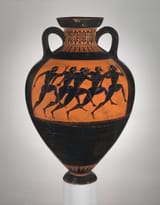Religious and Cultural Foundations
Athletic contests were originally tied to religious festivals honoring the gods (especially Zeus and Apollo).
The Olympic Games, founded in 776 BCE, were held at Olympia as part of a festival to Zeus. Similar Panhellenic games existed at Delphi (Pythian), Isthmia (Poseidon), and Nemea (Zeus).
Victories were seen as offerings to the gods, with athletes often dedicating statues or sacrifices in sanctuaries.
Civic and Political Importance
Success in athletics brought prestige not just to the athlete but also to their city-state (polis). A victorious Olympian could elevate the reputation of their entire community.
City-states invested resources in training athletes because victory was seen as a symbol of civic strength and identity.
Athletic festivals provided neutral ground where rival poleis could come together under truces (the Olympic truce, or ekecheiria).
Education and Virtue (Arete)
Athletics were part of the Greek idea of arete — excellence, manly virtue, and the pursuit of personal and civic perfection.
Boys were trained in gymnasia not only for military readiness but also to embody ideals of beauty (kalokagathia — the union of moral and physical excellence).
Competitions were seen as a test of discipline, courage, and self-control.
Entertainment and Community Life
Athletic festivals were massive gatherings with sporting events, music, drama, and feasting — unifying moments for Greek identity.
Athletes achieved fame akin to modern celebrities; poets like Pindar composed victory odes for celebrated champions.
Broader Social Role
Athletics also reinforced social hierarchies: typically, only free Greek males of citizen status could compete. Women and non-Greeks had restricted roles, though some (like Spartan women) had their own athletic traditions.
athletics were not just sports in Ancient Greece — they were religion, politics, education, and culture all rolled into one. They embodied what it meant to be Greek.
